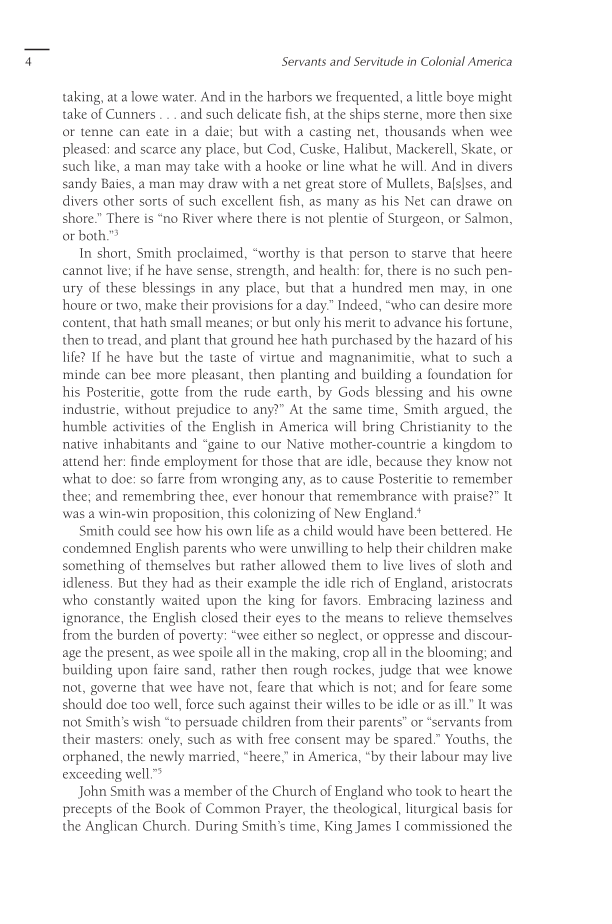4 Servants and Servitude in Colonial America
taking, at a lowe water. And in the harbors we frequented, a little boye might
take of Cunners . . . and such delicate fish, at the ships sterne, more then sixe
or tenne can eate in a daie; but with a casting net, thousands when wee
pleased: and scarce any place, but Cod, Cuske, Halibut, Mackerell, Skate, or
such like, a man may take with a hooke or line what he will. And in divers
sandy Baies, a man may draw with a net great store of Mullets, Ba[s]ses, and
divers other sorts of such excellent fish, as many as his Net can drawe on
shore.” There is “no River where there is not plentie of Sturgeon, or Salmon,
or both.”3
In short, Smith proclaimed, “worthy is that person to starve that heere
cannot live; if he have sense, strength, and health: for, there is no such pen-
ury of these blessings in any place, but that a hundred men may, in one
houre or two, make their provisions for a day.” Indeed, “who can desire more
content, that hath small meanes; or but only his merit to advance his fortune,
then to tread, and plant that ground hee hath purchased by the hazard of his
life? If he have but the taste of virtue and magnanimitie, what to such a
minde can bee more pleasant, then planting and building a foundation for
his Posteritie, gotte from the rude earth, by Gods blessing and his owne
industrie, without prejudice to any?” At the same time, Smith argued, the
humble activities of the English in America will bring Christianity to the
native inhabitants and “gaine to our Native mother-countrie a kingdom to
attend her: finde employment for those that are idle, because they know not
what to doe: so farre from wronging any, as to cause Posteritie to remember
thee; and remembring thee, ever honour that remembrance with praise?” It
was a win-win proposition, this colonizing of New England.4
Smith could see how his own life as a child would have been bettered. He
condemned English parents who were unwilling to help their children make
something of themselves but rather allowed them to live lives of sloth and
idleness. But they had as their example the idle rich of England, aristocrats
who constantly waited upon the king for favors. Embracing laziness and
ignorance, the English closed their eyes to the means to relieve themselves
from the burden of poverty: “wee either so neglect, or oppresse and discour-
age the present, as wee spoile all in the making, crop all in the blooming; and
building upon faire sand, rather then rough rockes, judge that wee knowe
not, governe that wee have not, feare that which is not; and for feare some
should doe too well, force such against their willes to be idle or as ill.” It was
not Smith’s wish “to persuade children from their parents” or “servants from
their masters: onely, such as with free consent may be spared.” Youths, the
orphaned, the newly married, “heere,” in America, “by their labour may live
exceeding well.”5
John Smith was a member of the Church of England who took to heart the
precepts of the Book of Common Prayer, the theological, liturgical basis for
the Anglican Church. During Smith’s time, King James I commissioned the
































































































































































































































